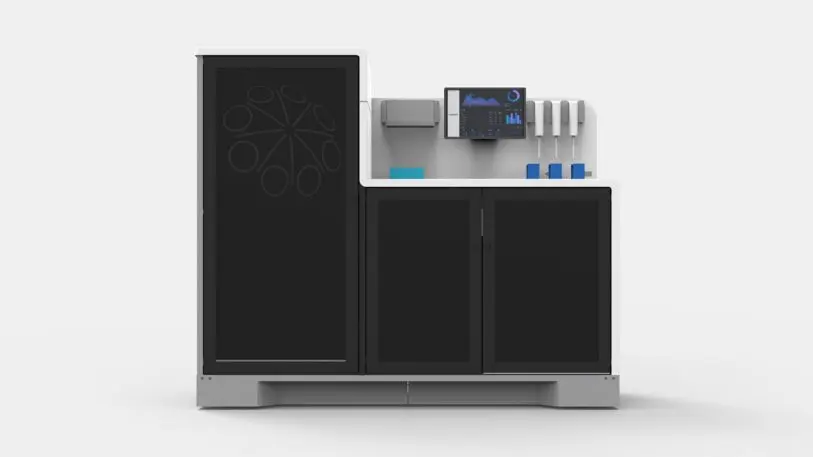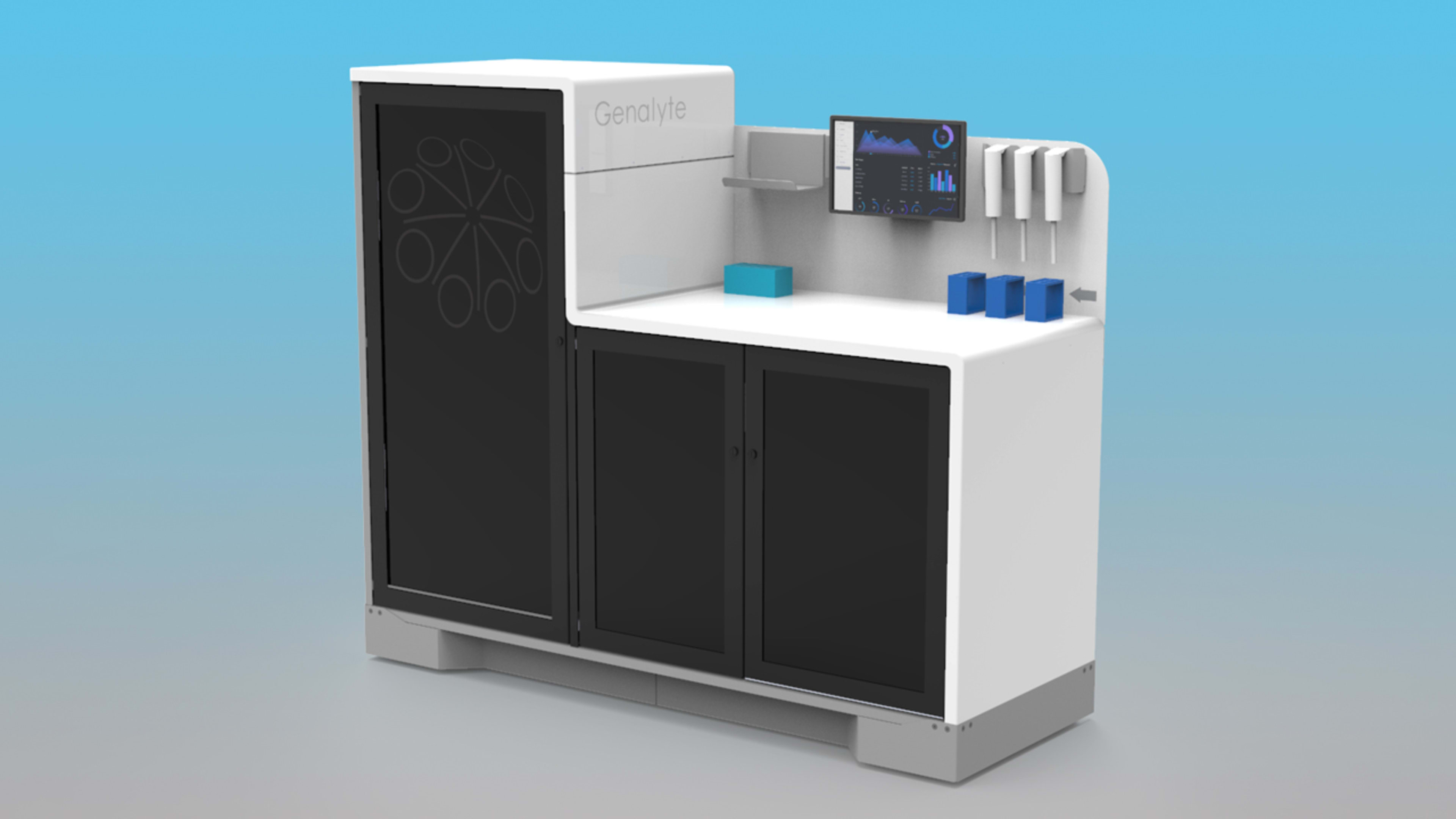Last month, I had my blood work requested, tested, and analyzed–in less time than it takes to get a manicure.
My medical results, which took about 15 minutes, were courtesy of diagnostics startup Genalyte, which spent the last decade perfecting a portable lab that can run 62 tests with just several drops of blood. Dubbed the Maverick Detection System, the mini-fridge-sized device uses microchip technology to analyze multiple antibodies and other proteins. It digitizes the samples and sends them to a cloud-based laboratory for review, sending results to the physician in real time.
I tested out the process at the company’s headquarters in San Diego. The “lab” was composed of a chair, the 15-inch wide Maverick perched on a rollaway cart (dubbed the Merlin), and a kind nurse who promised she would not tell me when she inserted the needle in my arm. Less than one vial of blood was extracted.
A short time later, Dr. Rick Hockett, the pathologist who serves as Genalyte’s chief medical officer, sat me down for a brief overview of the results. I was relieved to discover that I did not have any wheat sensitivities–and therefore free to continue on my glutenous path of destruction.
“Everything is within normal limits,” Hockett says. “Boringly normal, as I tell most people.”

No doctor assigned additional tests as I walked out the door, followed by an ongoing round of phone tag to deliver results. That’s if your doctor even bothers to call you back. “No news is good news,” they like to say, but how are you supposed to assume things are fine and that your doctor didn’t just drop the ball?
Genalyte CEO Cary Gunn, an electrical engineer with a Ph.D. from Caltech who founded the company in 2007, recalls interacting with stressed medical offices attempting to juggle incoming and outgoing blood tests, with patients anxiously awaiting results. When the tests do arrive, doctors wrack their heads trying to recall the patient. “Doctors spend two hours a day having to open up medical records and remind themselves who these patients were,” explains Gunn. Sometimes results get lost or mixed up. It’s believed that almost one-third of misdiagnosed malpractice cases are the result of this disjointed process.
Then there’s the quarter of patients who fail to follow doctor’s orders and ever get tested because it just seems like, well, such a hassle.
“This really seemed like a broken system,” Gunn says of the global blood testing market, now estimated at over $51.5 billion, according to Grand View Research. It’s a crowded, competitive industry with more than 5,000 available lab tests, but one that’s slated to grow to $62.9 billion by 2024. “We should be able to do all of these diagnostic tests in a couple of minutes.”
I know what you’re thinking
Genalyte sounds alarmingly easy, eerily echoing the last time we read about a too-good-to-be-true blood-testing service: Theranos.
When it was discovered starting in the fall of 2015 that Theranos, the secretive blood diagnostics company, had falsified its technology and results, it ushered in an era of industry skepticism for blood-testing innovations. Theranos founder Elizabeth Holmes claimed her blood-testing devices could perform a full suite of lab tests with just a small blood sample, which helped her raise in excess of $700 million in funding. In reality, it could only perform a small fraction of those tests, a secret it kept from investors, health partners, and even its own employees. Earlier this year, the company, which was first established in 2003, was charged with fraud by the SEC.
Bruce Carlson, publisher of Kalorama Information which specializes in healthcare, says plenty of doubts plagued Theranos, especially from leaders within the lab community and in vitro diagnostics (IVD). It wasn’t as if the health industry was completely taken by surprise. Still, while the diagnostics market wasn’t too damaged by the Theranos scandal, it did leave the industry “wary of a new company coming down the road that makes promises.”
Genalyte’s founder concedes that whenever the Theranos scandal surfaces again in the headlines, customers get nervous. On the other hand, the publicity serves the startup in some ways: As soon as you say, “It’s like Theranos, but it works,” people immediately understand the vision of decentralizing testing, rapid results, and cost-effectiveness. “So the concept has been sold,” Gunn notes. “It’s just too bad it hasn’t been executed in a responsible manner.”
Genalyte wildly differs from its former competitor, both scientifically and ethically. For example, it eschews the finger-prick method (which Theranos relied on) for vein withdrawal, as the former often contains damaged fluid from the puncture wound. It also withdraws 10ul (microliters) of blood instead of just one drop, a concept Elizabeth Holmes pursued so doggedly that it ultimately led to her ruin. Relying on a single drop of blood raises a number of problems since there’s often a wide range of results between individual drops from the same person.
The young startup also decided to focus on one area–or particularly, one type of doctor: rheumatologists.
Rheumatologists are internists who specialize in diagnosing and treating chronic diseases or autoimmune conditions. They often see patients four to six times a year, with many developing decades-long relationships. That dynamic appealed to the Genalyte founder, who crafted the Maverick to offer 62 tests, “the lion’s share of what a rheumatologist needs,” says Gunn.
Should doctors need more specialized or genetic tests, they can easily request them through Genalyte’s centralized lab, which delivers results overnight (i.e, not through the cloud).
Finally, Genalyte permits the medical community–and investors–to inspect its technology. It offers numerous white papers and has published clinical studies in peer-reviewed journals. Theranos, by contrast, treated its inner mechanisms as trade secrets.
“We are happy to walk people through our facility and show them how and where we make things,” says Gunn, explaining his belief in company transparency. “We do that on a frequent basis.”
Vijit Sabnis, a venture partner at Khosla Ventures, is a leading investor in Genalyte, which has raised more than $91 million in funding to date. He and the firm have long focused on biotech and AI-enabled healthcare technologies, and Sabnis says he personally spent more than four months validating the research and digging through “every dirty little detail.” Like Gunn, Sabnis holds a Ph.D. in electrical engineering, and he feels fully confident in Genalyte’s science, stating, “It’s probably the best protein measurement platform.”
Khosla Ventures had considered investing in Theranos, Sabnis tells Fast Company, but quickly moved on.
“We looked at its patents, and we just couldn’t see and understand what they had,” he says. “We just decided maybe there isn’t anything there.”
Sabnis believes Genalyte can transform the healthcare process, for both patients and insurance providers. “We’re going to be able to collect a lot of data, which is going to be more and more valuable,” says Sabnis.
Diagnostic testing composes just a small percentage–under 3%–of healthcare spending, yet it’s involved in nearly 70% of all clinical decisions. While it doesn’t attract the kind of investments typically seen in biotech and biopharmaceuticals, it’s an essential sector that can significantly reduce overall costs, notes Kalorama’s Carlson, especially for point of care. “There’s opportunity for growth.”
There are now hundreds of startups devoted to point-of-care tests in various areas. That Genalyte positioned itself as a means to drastically alter the patient experience puts it at an advantage. “There is an interest in getting those results to the physician during that office visit,” says Carlson. “That’s something that everybody is trying to improve.”

Changing ‘the way things have been done’
Genalyte recently launched a pilot program with six clinics in San Diego. The goal is to prove that 100% of patients prefer its integrated testing system, and that it can cut down on physician error. Such data will prove valuable prior to reaching out to larger healthcare systems. There is no upfront cost to doctors (Genalyte owns the machines); they only pay the cloud lab testing fees. As for data privacy, all medical information and records are maintained and stored in computer systems validated to HIPAA levels of compliance.
Dr. Dana Reddy of SD Rheumatology in Chula Vista, California, is one such doctor participating in the pilot program. The rheumatologist vouches for the Maverick’s effect on patient compliance and day-to-day office workflow.
“In rheumatology, we order so many lab tests–we can’t really follow up with every single person about every normal lab value, and some patients are more anxious than others,” says Reddy. “With Genalyte, you don’t have to be in charge of contacting them later or having them come back in just to go over something that you could get the very same day.”
There are, however, minor pain points. The Maverick machine, which sits on a three-foot wide cart and includes a technician workspace, storage, networking equipment, and basic testing equipment, takes up a lot of space. Clinics must also accommodate an extra 20 to 30 minutes during patient visits.
Physicians, especially those of an older generation, aren’t keen to change “the way things have been done,” says Gunn. “We definitely found the longer a doctor has been in practice, the less excited they are.”
Gunn says the end goal is to “test every patient for everything every time they touch the health-care system.” Such enthusiasm does attract its share of critics, especially those wary of medical over-testing. Too much information, some counter, can make doctors jump to unnecessary decisions. As with full ultrasound or MRI scans, you will most certainly find something abnormal, which leads to excessive medical intervention. “Sometimes the cost of that outweighs the benefits of just never having the scan in the first place,” explains Gunn.
Moving forward, Genalyte has bigger plans in the works–specifically, by getting smaller. Gunn says the next iteration of the device will hopefully be two feet by two feet. “That’s the goal,” he says. “We’re going to have a next-generation version of that machine sitting in every doctor’s office.”
Currently, the Genalyte platform shares results without any further insight or actionable information. Human oversight is still necessary in such cases where results are computer driven. With further collected data, Genalyte will go beyond its current limited scope.
“The way we deliver medical test results has to change today,” says Gunn. “What people want is the next level of interpretation.”
To that end, Genalyte will use machine learning to flag trends, thereby improving chart assessments and reducing the odds of mistakes. This method has already been adopted to spot potential tumors in radiology review. “We’re talking about the same approach, but on a much more diverse data set acquired over the lifetime of the patient,” Gunn explains in a follow-up email. “There will be a time where we think it was silly that we were asking human brains to evaluate patient health by glancing at long lists of numbers.”
In essence, Genalyte could just become the physician’s assistant in deciphering blood test data trends, all with the help of several drops of blood. “[Genalyte] would be able to guide them in the right direction,” he says, noting, “you don’t want to replace the doctor. You’d want to augment them.”
Recognize your brand’s excellence by applying to this year’s Brands That Matter Awards before the early-rate deadline, May 3.
